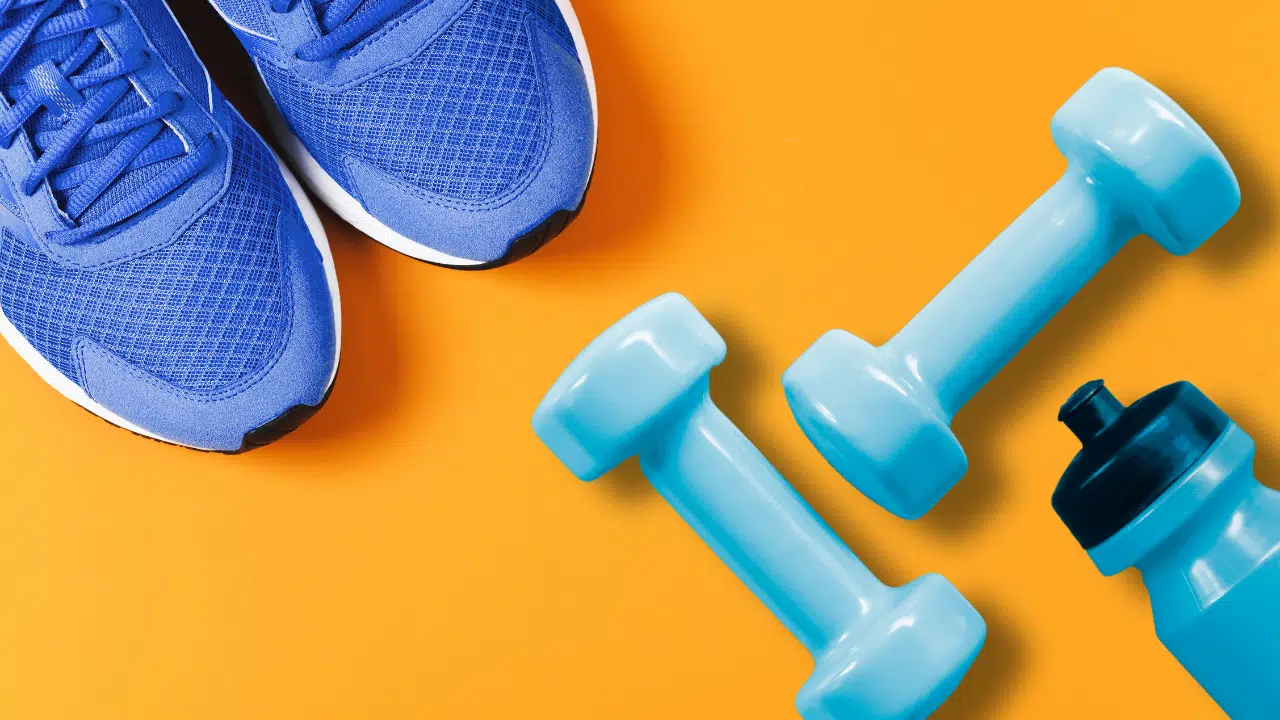Is it just me or are gyms a hotter destination than Europe at the moment? Blame it on the winter chill.
But, do you reckon exercise is all about toned abs and bulging biceps? Think again!
When you move your body, you aren’t just shaking up those muscles; you’re also giving a nice stir to your gut.
Here’s how exercise and gut health are intricately related!
Jumpstart Your Journey: How Exercise Affects Gut Health
1. Improves Gut Motility
Okay, picture this: your body is a bustling city, and your gut, well, it’s the downtown traffic.
Now, what does exercise do? It steps in like the world’s most enthusiastic traffic cop, waving its arms, blowing its whistle, and getting things moving in your digestive highway.
Exercise, particularly aerobic ones like running or cycling, increases what’s called gut motility (ooh! fancy words). It’s like a gentle nudge to your intestines saying, “Come on, let’s keep things moving along!” So, for all you folks battling the infamous traffic jam called constipation, a gentle exercise nudge could be your best ally.
2. Improves Microbiome Diversity
But the fun doesn’t stop there! Exercise isn’t just a traffic cop; it’s also the most fantastic party host in town. It throws this fabulous bash in your gut where all kinds of good bacteria come to mingle.
The result? A more diverse microbiota – that’s science-speak for a healthy mix of bacteria in your gut. This bacterial cocktail party plays a crucial role in everything from digestion to immunity.
So, every time you hit the gym, remember you’re not just working on those abs, you’re also playing host to a rave in your digestive system.
3. Reduces Inflammation
Now, let’s bring in the final act: inflammation, the uninvited party crasher. It waltzes into your gut causing all sorts of problems like bloating, pain, and other discomforts. But never fear, exercise is here!
With a heroic thump of the hammer (kinda like Thor), regular exercise helps kick inflammation out of the party, making your gut a happier and healthier place.
So there you have it, from traffic cop to party host to superhero, exercise dons many hats in its mission to keep your gut health in check. And let me tell you, it does a fantastic job!
Great Exercises for a Happy Gut
Aerobic Exercises
Gather ’round, runners and cyclists, for your efforts are truly reaping rewards, even if it’s not immediately apparent in those calf muscles.
You see, aerobic exercises are the maestros conducting a digestive symphony in your body. They ramp up the speed of your digestive transit – a fancy term for food moving through your system – making sure everything flows like a well-rehearsed orchestra.
What’s the encore? Reduced chance of constipation and bloating.
Yoga
Yoga is like that one friend who’s always there to help you breathe, stretch, and contort your way out of trouble.
These gentle movements and deep, meditative breaths do wonders for your gut. They help relieve tension and stress, both of which can mess with your digestion.
Plus, certain poses literally squeeze your internal organs, which is like giving your gut a gentle massage. Now who wouldn’t want that?
Resistance Training
While lifting weights might be all about the “gun show” for some, there’s a secret benefit that’s easy to overlook – a healthier gut!
Resistance training can contribute to better body composition (read: less fat, more muscle), which is linked to a healthier microbiome.
So the next time you’re pumping iron, just remember: you’re not just crafting those round glutes, you’re sculpting a healthier gut too!
Pilates
Pilates, the sophisticated cousin of yoga, takes centre stage when it comes to core strength.
Those planks and leg lifts aren’t just for the six-pack dreams; they help keep your digestive system in check, too. By strengthening your core, you’re improving your gut motility.
So, embrace the burn because every twist and squeeze is bringing you closer to a happier tummy!
Walking
Yes, walking, the underdog of the exercise world, is a digestive health hero in disguise!
It’s as simple as this: a light 10-minute stroll, especially half an hour after meals, can boost your digestion and reduce blood sugar spikes.
It’s the fitness equivalent of a superhero casually striding away from an explosion – it looks cool, feels great, and works wonders for your gut health!
Debunking the 10,000 Steps Myth: Where Did It Come From?
And speaking of balance, let’s jog our memory back to the 1960s when the 10,000 steps rule started doing the rounds.
This one-size-fits-all guideline was born out of a marketing campaign for a Japanese pedometer named “Manpo-kei”, which means “10,000 steps meter”.
Funny, right? But as we know, individual fitness needs vary greatly, so it’s essential to adjust your step count to what works for you.
The Balancing Act: Can Too Much Exercise Affect Digestion?
But here’s the catch – you might think, “So, if some exercise is good, more must be better, right?” Not so fast, speedy!
Exercising too much could stimulate your body to produce additional cortisol – our stress hormone. This sneaky hormone can make your digestion go haywire, leading to symptoms like nausea, stomach cramps, and diarrhea. So remember, when it comes to exercise, balance is key!
Exercise vs. Physical Movement: What’s More Important?
You might be wondering, “Should I be focusing on formal exercise, or is general physical movement enough?” It’s a hot debate, but let’s simmer it down.
While structured exercise is great, don’t underestimate the power of everyday movement. Dance while you do the dishes, take the stairs, chase your kids (or your dog), or get gardening.
Your gut won’t discriminate between a Zumba class or a spirited house cleaning session. All movement is good movement!
The Gut Check: Can Exercise Cure GERD and IBS Symptoms?
Now, onto a burning question. Can exercise cure GERD (Gastroesophageal Reflux Disease) and IBS (Irritable Bowel Syndrome) symptoms? While exercise is not a magic cure, it can certainly help manage these conditions.
Light to moderate exercise, like walking or cycling, can help reduce IBS symptoms by stimulating the natural contraction of intestinal muscles. For GERD sufferers, gentle workouts can aid in maintaining a healthy weight, which is beneficial in managing GERD symptoms.
Remember, it’s essential to listen to your body and seek professional advice before starting an exercise regime if you have these conditions.
References
- Clarke, S. F., Murphy, E. F., O’Sullivan, O., Ross, R. P., O’Toole, P. W., Shanahan, F., … & Cotter, P. D., “Exercise and the Microbiota,” Gut Microbes, vol. 6, no. 2, pp. 131-136, 2015.
- Monda, V., Villano, I., Messina, A., Valenzano, A., Esposito, T., Moscatelli, F., … & Messina, G., “Exercise Modifies the Gut Microbiota with Positive Health Effects,” Oxidative Medicine and Cellular Longevity, vol. 2017, 2017.
- Puetz, T. W., “Physical Activity and Feelings of Energy and Fatigue,” Sports Medicine, vol. 36, no. 9, pp. 767-780, 2006.
- Pascoe, M. C., & Bauer, I. E., “A systematic review of randomised control trials on the effects of yoga on stress measures and mood,” Journal of Psychiatric Research, vol. 68, pp. 270-282, 2015.
- Hill, E. E., Zack, E., Battaglini, C., Viru, M., Viru, A., & Hackney, A. C., “Exercise and circulating cortisol levels: the intensity threshold effect,” Journal of Endocrinological Investigation, vol. 31, no. 7, pp. 587-591, 2008.
- Tudor-Locke, C., & Bassett, D. R., “How Many Steps/Day Are Enough?” Sports Medicine, vol. 34, no. 1, pp. 1-8, 2004.
- Choi, B. C. K., Pak, A. W. P., & Choi, J. C. L., “Daily step goal of 10,000 steps: A literature review,” Clinical & Investigative Medicine, vol. 30, no. 3, pp. E146-E151, 2007.
- Dahl, C., & Söderström, L., “Physical exercise and irritable bowel syndrome: A comprehensive review,” Journal of Physical Activity and Health, vol. 16, no. 2, pp. 155-162, 2019.
- El-Serag, H. B., “Role of obesity in GORD-related disorders,” Gut, vol. 58, no. 3, pp. 333-343, 2009.
- Bressa, C., Bailén-Andrino, M., Pérez-Santiago, J., González-Soltero, R., Pérez, M., Montalvo-Lominchar, M. G., … & Larrosa, M., “Differences in gut microbiota profile between women with active lifestyle and sedentary women,” PloS One, vol. 12, no. 2, e0171352, 2017.
- L. Houghton and D. Read, “Effect of a post meal walk on digestion: a randomized controlled trial,” Journal of Gastroenterology and Hepatology, vol. 14, no. 3, pp. 247-251, 1999.














